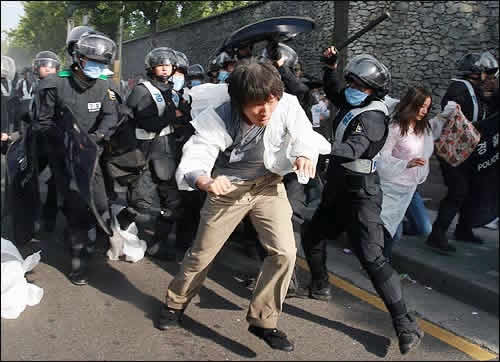|














|
|
|
NEWS & LETTERS, June - July 2008
New South Korean resistance
May of this year in Korea started with a public gathering called "Candle Light Culture Festival," but the festival turned into a demonstration against the current president, Lee Myung-bak (from the conservative party), and his government. Tens of thousands of angry citizens congregated at Seoul Plaza in front of Seoul City Hall and the focus of this demonstration is becoming a nationwide battle against what some call "neo-fascism." The current Korean government from the start (February 2008) has been working on the following policies.
- Privatization of public sectors such as water, gas, electricity, and healthcare
- Construction of a great canal that runs through Korea, which will cause environmental damage but will benefit many construction companies including Hyundai (President Lee was its CEO)
- Importing U.S beef that is at risk for BSE (mad cow disease)
- Attempting control over internet portal sites and broadcasting
In April 2008, President Lee announced during a visit to the U.S. that the government would import U.S. beef with no condition about the risk of mad cow disease. His announcement sparked the anger of the Korean people, because they thought that the government humiliatingly gave up the sovereign power of quarantine inspection for signing the Korea-U.S. Free Trade Agreement (FTA). From May 2, tens of thousands of people daily held a candlelight vigil in downtown Seoul and asked for renegotiation with the U.S. government. However, President Lee and his government continued to disappoint the people with their insincere attitude and lack of commitment to settle the issue, and it made the people more angry. As a result, more and more people, from children to old men, took part in the candlelight vigils day by day, and finally the candlelight vigil turned into an anti-government demonstration taking over the streets. The government was baffled and put down the demonstrations violently using water cannons.

After the violent crushing by riot police, the demonstrators felt that their just claims to correct the mistakes of the government were ignored, and that President Lee had no intention of protecting the people. Furthermore, President Lee and his government have tried to control the press and broadcasting (including internet portal sites) to be used only for carrying through wrong policies, never accepted by the majority of the Korean people, such as privatization of public sectors, construction of a great canal, and signing the Korea-U.S. FTA.
The Korean people feel that their democratic rights and principles, established through struggle and resistance, are damaged and violated by the despotic government in favor of the conservative segments in Korea, so they began to chant for anti-privatization, anti-great canal, anti-FTA, anti-government, and the impeachment of President Lee as well as the renegotiation with the U.S. government for importing U.S. beef. Against the political attack of the conservatives, by taking to the streets, many Korean people make clear the democratic principle that nobody can damage and put back to the past the principle that all state power and authority emanate from the people.
The crisis of democracy which the Korean people felt, called together a million people on June 10, the 21st anniversary of "Great Struggle of 1987." The candlelight vigils and demonstrations in Korea have continued to be held for 51 days.
The candlelight vigils and demonstrations that are going on in Korea have some important meanings.
- They are going on without any guidance, divisions or leaders. Only spontaneous or autonomous participation of citizens on the internet network daily organize the candlelight vigils and demonstrations. As it is unusual and never seen before, some say that "collective intelligence" or "intelligence of the multitude" leads the struggle and resistance. In any case, it is obvious that these unusual and new ways of social movement in Korea imply so many practical meanings.
- It presents new opportunities and possibilities for a direct or pure democracy against conditions where the representative organs, such as the National Assembly occupied by the conservative parties, are unable to accept or understand the progressive demands of the people. However, it is also obvious that this phenomenon asks some questions of the relation between the public and the political party to the progressive and leftist parties as well as to the conservative parties.
--Two South Korean activists
|

